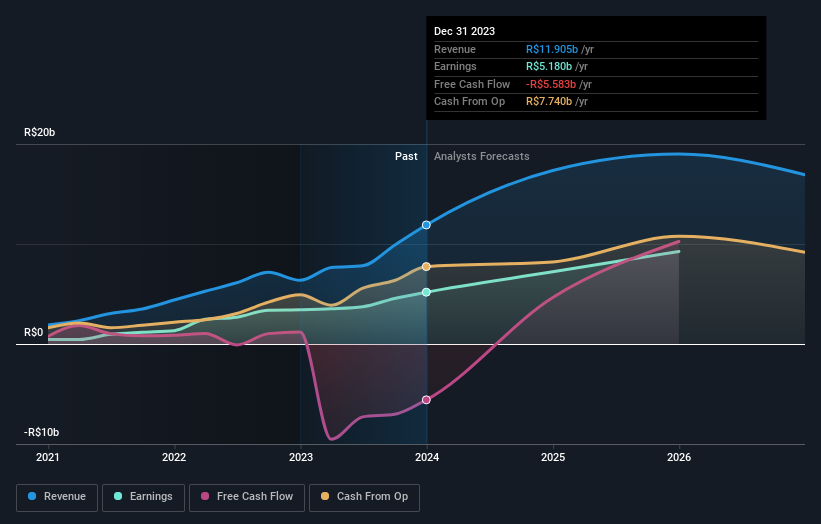- Brazil
- /
- Oil and Gas
- /
- BOVESPA:PRIO3
Prio S.A. Recorded A 6.6% Miss On Revenue: Analysts Are Revisiting Their Models

The annual results for Prio S.A. (BVMF:PRIO3) were released last week, making it a good time to revisit its performance. Results look mixed - while revenue fell marginally short of analyst estimates at R$12b, statutory earnings were in line with expectations, at R$6.11 per share. Following the result, the analysts have updated their earnings model, and it would be good to know whether they think there's been a strong change in the company's prospects, or if it's business as usual. We've gathered the most recent statutory forecasts to see whether the analysts have changed their earnings models, following these results.
Check out our latest analysis for Prio

Taking into account the latest results, the current consensus from Prio's nine analysts is for revenues of R$17.3b in 2024. This would reflect a substantial 46% increase on its revenue over the past 12 months. Statutory per-share earnings are expected to be R$6.13, roughly flat on the last 12 months. Before this earnings report, the analysts had been forecasting revenues of R$16.2b and earnings per share (EPS) of R$8.10 in 2024. So it's pretty clear the analysts have mixed opinions on Prio after the latest results; even though they upped their revenue numbers, it came at the cost of a pretty serious reduction to per-share earnings expectations.
There's been no major changes to the price target of R$63.57, suggesting that the impact of higher forecast revenue and lower earnings won't result in a meaningful change to the business' valuation. The consensus price target is just an average of individual analyst targets, so - it could be handy to see how wide the range of underlying estimates is. The most optimistic Prio analyst has a price target of R$81.00 per share, while the most pessimistic values it at R$45.90. There are definitely some different views on the stock, but the range of estimates is not wide enough as to imply that the situation is unforecastable, in our view.
Taking a look at the bigger picture now, one of the ways we can understand these forecasts is to see how they compare to both past performance and industry growth estimates. The period to the end of 2024 brings more of the same, according to the analysts, with revenue forecast to display 46% growth on an annualised basis. That is in line with its 47% annual growth over the past five years. By contrast, our data suggests that other companies (with analyst coverage) in a similar industry are forecast to see their revenue shrink 0.9% annually. So not only is Prio expected to maintain its revenue growth despite the wider downturn, it's also forecast to grow faster than the industry as a whole.
The Bottom Line
The most important thing to take away is that the analysts downgraded their earnings per share estimates, showing that there has been a clear decline in sentiment following these results. On the plus side, they also lifted their revenue estimates, and the company is expected to perform better than the wider industry. There was no real change to the consensus price target, suggesting that the intrinsic value of the business has not undergone any major changes with the latest estimates.
With that in mind, we wouldn't be too quick to come to a conclusion on Prio. Long-term earnings power is much more important than next year's profits. At Simply Wall St, we have a full range of analyst estimates for Prio going out to 2026, and you can see them free on our platform here..
Before you take the next step you should know about the 1 warning sign for Prio that we have uncovered.
If you're looking to trade Prio, open an account with the lowest-cost platform trusted by professionals, Interactive Brokers.
With clients in over 200 countries and territories, and access to 160 markets, IBKR lets you trade stocks, options, futures, forex, bonds and funds from a single integrated account.
Enjoy no hidden fees, no account minimums, and FX conversion rates as low as 0.03%, far better than what most brokers offer.
Sponsored ContentNew: Manage All Your Stock Portfolios in One Place
We've created the ultimate portfolio companion for stock investors, and it's free.
• Connect an unlimited number of Portfolios and see your total in one currency
• Be alerted to new Warning Signs or Risks via email or mobile
• Track the Fair Value of your stocks
Have feedback on this article? Concerned about the content? Get in touch with us directly. Alternatively, email editorial-team (at) simplywallst.com.
This article by Simply Wall St is general in nature. We provide commentary based on historical data and analyst forecasts only using an unbiased methodology and our articles are not intended to be financial advice. It does not constitute a recommendation to buy or sell any stock, and does not take account of your objectives, or your financial situation. We aim to bring you long-term focused analysis driven by fundamental data. Note that our analysis may not factor in the latest price-sensitive company announcements or qualitative material. Simply Wall St has no position in any stocks mentioned.
About BOVESPA:PRIO3
Prio
Engages in the exploration, development, and production of oil and natural gas properties in Brazil and internationally.
Very undervalued with solid track record.


